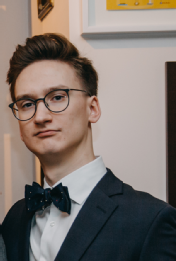Wojciech Stark

Postgraduate Research Student (joint with Prof. Scott Habershon)
Joined in June 2020.
Project title:
Computational study of nonadiabatic and quantum tunnelling effects in reactive hydrogen chemistry on metals.
About the project:
The unique electronic structure of metals may cause significant differences between classical adiabatic molecular dynamics (MD) and experimental results. Traditionally, molecular dynamics methods utilize the Born-Oppenheimer approximation, which assumes the separation of electronic and nuclear degrees of freedom and enables nuclear dynamics to be described by a single potential energy surface (PES). However, on metallic surfaces, the energy exchange between adsorbate and surface atoms is often significant and causes the breakdown of the Born-Oppenheimer approximation.
There are multiple methods to include such nonadiabatic effects, with one of the most efficient being molecular dynamics with electronic friction (MDEF) [Head-Gordon et al. JCP 1995]. MDEF introduces the non-adiabatic effects by means of both electronic friction and random forces. However, a meaningful comparison between computational simulations and experiments demands the capability to run thousands of MDEF trajectories which are currently unfeasible through ab initio MD. In this context, machine learning provides a lighter model to compute the electronic friction tensor and the PES allowing us to overcome this computational limitation.
I currently work on developing ML-based models that enable the simulation of adiabatic and nonadiabatic molecular dynamics of hydrogen molecules at different copper surfaces.
Previous education:
BSc, MSc in Chemical Technology and Catalysis (Warsaw University of Technology)
Links:
wgst.github.ioLink opens in a new window
GoogleScholarLink opens in a new window
